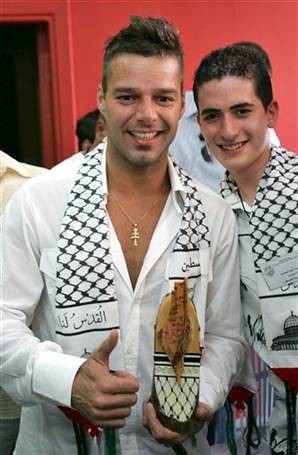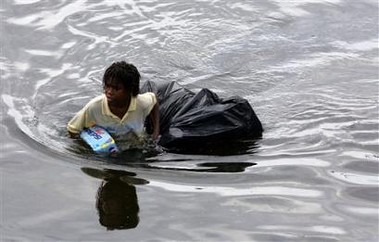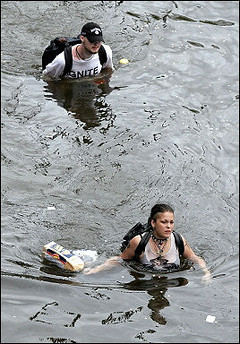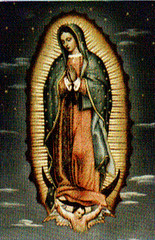Download the song here
Read the lyrics here

Islam is at the heart of an emerging global anti-hegemonic culture that combines diasporic and local cultural elements, and blends Arab, Islamic, black and Hispanic factors to generate "a revolutionary black, Asian and Hispanic globalization, with its own dynamic counter-modernity constructed in order to fight global imperialism. (say what!)

And God said, "Let there be light"; and there was light. And God saw that the light was good; and God separated the light from the darkness.
In the beginning was the Word, and the Word was with God, and the Word was God. He was in the beginning with God; all things were made through him, and without him was not anything made that was made. In him was life, and the life was the light of men. The light shines in the darkness, and the darkness has not overcome it. [...] The true light that enlightens every man was coming into the world. He was in the world, and the world was made through him, yet the world knew him not. (John 1:1-5,9-10)
The LORD created me at the beginning of his work,
the first of his acts of old.
Ages ago I was set up, at the first,
before the beginning of the earth.
When there were no depths I was brought forth,
when there were no springs abounding with water.
Before the mountains had been shaped,
before the hills, I was brought forth;
before he had made the earth with its fields,
or the first of the dust of the world.
When he established the heavens, I was there,
when he drew a circle on the face of the deep,
when he made firm the skies above,
when he established the fountains of the deep,
when he assigned to the sea its limit,
so that the waters might not transgress his command,
when he marked out the foundations of the earth,
then I was beside him, like a master workman;
and I was daily his delight,
rejoicing before him always,
rejoicing in his inhabited world
and delighting in the sons of men.
(Proverbs 8:22-31)
It is related that Jabir ibn `Abd Allah said to the Prophet : "O Messenger of Allah, may my father and mother be sacrificed for you, tell me of the first thing Allah created before all things." He said: "O Jabir, the first thing Allah created was the light of your Prophet from His light, and that light remained (lit. "turned") in the midst of His Power for as long as He wished, and there was not, at that time, a Tablet or a Pen or a Paradise or a Fire or an angel or a heaven or an earth. And when Allah wished to create creation, he divided that Light into four parts and from the first made the Pen, from the second the Tablet, from the third the Throne, [and from the fourth everything else]."
And do not abuse those whom they call upon besides Allah, lest exceeding the limits they should abuse Allah out of ignorance. Thus have We made fair seeming to every people their deeds; then to their Lord shall be their return, so He will inform them of what they did. [6.108]For me this is one of the more interesting verses of the Quran. It is remarkable that a relgion as iconoclastic as Islam would still caution Muslims against making fun of other folks' idols. There is alot of wisdom in that. Firstly, if you are rude to people and lack common courtesy you will probably turn people away from Islam rather than attract them. As they say, you can catch more flies with honey than with vinegar. But secondly, we don't always know what is really in the other person's heart and mind just by outwardly looking at their religious practicies. So just as we get upset when people accuse Muslims of worshiping the moon or worshiping the black stone in the Kaaba, we should be slow to make unwarranted assumptions about others. And that's true whether you are talking about other religious groups (e.g. "Zoroastrians are idolaters, they worship fire") or individuals (e.g. "She doesn't wear hijab. I'll bet she sleeps around too".)
Behold! the disciples, said: "O Jesus the son of Mary! can thy Lord send down to us a table set (with viands) from heaven?" Said Jesus: "Fear Allah, if ye have faith."
"And behold! I inspired the disciples to have faith in Me and Mine Messenger. they said, 'We have faith, and do thou bear witness that we bow to Allah as Muslims'".
They said: "We only wish to eat thereof and satisfy our hearts, and to know that thou hast indeed told us the truth; and that we ourselves may be witnesses to the miracle."
Said Jesus the son of Mary: "O Allah our Lord! Send us from heaven a table set (with viands), that there may be for us - for the first and the last of us - a solemn festival and a sign from thee; and provide for our sustenance, for thou art the best Sustainer (of our needs)." (Quran: 5:111-114)

On the question of racial discrimination, the Addis Ababa Conference taught, to those who will learn, this further lesson: That until the philosophy which holds one race superior and another inferior is finally and permanently discredited and abandoned: That until there are no longer first-class and second class citizens of any nation; That until the color of a man's skin is of no more significance than the color of his eyes; That until the basic human rights are equally guaranteed to all without regard to race; That until that day, the dream of lasting peace and world citizenship and the rule of international morality will remain but a fleeting illusion, to be pursued but never attained; And until the ignoble and unhappy regimes that hold our brothers in Angola, in Mozambique and in South Africa in subhuman bondage have been toppled and destroyed; Until bigotry and prejudice and malicious and inhuman self-interest have been replaced by understanding and tolerance and good-will; Until all Africans stand and speak as free beings, equal in the eyes of all men, as they are in the eyes of Heaven; Until that day, the African continent will not know peace. We Africans will fight, if necessary, and we know that we shall win, as we are confident in the victory of good over evil. - Haile Selassie I
Allah's Apostle said, "Every child is born with a true faith of Islam (i.e. to worship none but Allah Alone) but his parents convert him to Judaism, Christianity or Magianism, as an animal delivers a perfect baby animal. Do you find it mutilated?"
Abu Huraira said, "I heard Allah's Apostle saying, 'There is none born among the off-spring of Adam, but Satan touches it. A child therefore, cries loudly at the time of birth because of the touch of Satan, except Mary and her child." Then Abu Huraira recited: "And I seek refuge with You for her and for her offspring from the outcast Satan"The connection is interesting to me. While Islam doesn't have a doctrine of Original Sin, there are some provocative statements in Islamic sources which evoke the idea of the Immaculate Conception. For the catechetically-impaired, this is not a reference to the virgin birth of Jesus, which is also found in the Quran, but it specifically refers to the idea that Mary was conceived without the stain of Original Sin. I realize that it (believing in the immaculate conception without believing in original sin in the first place) may sound paradoxical but I plan to explain it in a further entry
When a woman of Imran said: My Lord! surely I vow to Thee what is in my womb, to be devoted (to Thy service); accept therefore from me, surely Thou art the Hearing, the Knowing.So when she brought forth, she said: My Lord! Surely I have brought it forth a female-- and Allah knew best what she brought forth-- and the male is not like the female, and I have named it Marium, and I commend her and her offspring into Thy protection from the accursed Shaitan.
Abu Huraira reported that Allah's Messenger (may peace be upon him) said: When Allah created the creation as He was upon the Throne, He put down in His Book: Verily, My mercy predominates My wrath.
'Umar b. Khattab reported that there were brought some prisoners to Allah's Messenger (may peace be upon him) amongst whom there was also a woman, who was searching (for someone) and when she found a child amongst the prisoners, she took hold of it, pressed it against her chest and provided it suck. Thereupon Allah's Messenger (may peace be upon him) said: Do you think this woman would ever afford to throw her child in the Fire? We said: By Allah, so far as it lies in her power, she would never throw the child in Fire. ' Thereupon Allah's Messenger (may peace be upon him) said: Allah is more kind to His servants than this woman is to her child.
Ali: We all know Bobby here a man. He a man, so nobody punking nobody here. Am I right, Buddha? Buddha, do you, or do you not recognize this is a man standing here?


As the Moslems swept through Spain in the 8th century, a great religious treasure was buried for safe-keeping in the earth, in the Estremadura Mountains. It was a much venerated statue of Our Lady holding the Divine Child Jesus that was a gift of Pope Gregory the Great to Bishop Leander of Seville. After the overthrow of the Moorish occupation, the image was uncovered in the year 1326, subsequent to a vision of Our Lady to a humble shepherd by the name of Gil. Our Lady's very special statue was enshrined in a nearby Franciscan Monastery next to the "Wolf River."
The Moslems, during their Spanish occupation, had actually named the river. The Islamic term for Wolf River is "Guadalupe" (Guada = River; Lupe = Wolf). Hence, the famous Catholic image in Spain has been known, since the 14th century, by the Islamic name of "Our Lady of Guadalupe."
Guadalupe. A river in the Spanish region of Extremadura was named by the Moors in Arabic wad(i)-al-hub 'river of love', due to the reputedly aphrodisiac qualities of its water. This river gave its name to the original sanctuary of Nuestra Señora de Guadalupe which contains a portrait of the Madonna as a woman with dark, Spanish features, nicknamed La Morenita 'the little Moorish woman', the patron saint of the Spanish world. The Spanish town of Guadalupe in Cáceres province is still a centre of pilgrimage.source

ROBERTSON: There was a popular coup that overthrew him [Chavez]. And what did the United States State Department do about it? Virtually nothing. And as a result, within about 48 hours that coup was broken; Chavez was back in power, but we had a chance to move in. He has destroyed the Venezuelan economy, and he's going to make that a launching pad for communist infiltration and Muslim extremism all over the continent.
You know, I don't know about this doctrine of assassination, but if he thinks we're trying to assassinate him, I think that we really ought to go ahead and do it. It's a whole lot cheaper than starting a war. And I don't think any oil shipments will stop. But this man is a terrific danger and the United ... This is in our sphere of influence, so we can't let this happen. We have the Monroe Doctrine, we have other doctrines that we have announced. And without question, this is a dangerous enemy to our south, controlling a huge pool of oil, that could hurt us very badly. We have the ability to take him out, and I think the time has come that we exercise that ability. We don't need another $200 billion war to get rid of one, you know, strong-arm dictator. It's a whole lot easier to have some of the covert operatives do the job and then get it over with.
Unfortunately, most of the major denominations still practice segregation in local churches, hospitals, schools, and other church institutions. It is appalling that the most segregated hour of Christian America is eleven o'clock on Sunday morning, the same hour when many are standing to sing: "In Christ There Is No East Nor West."~Martin Luther King, Jr., Stride Toward Freedom: The Montgomery Story, 1958 (source)
Before the modern period, Jews, Christians and Muslims all relished highly allegorical interpretations of scripture. The word of God was infinite and could not be tied down to a single interpretation. Preoccupation with literal truth is a product of the scientific revolution, when reason achieved such spectacular results that mythology was no longer regarded as a valid path to knowledge.
We tend now to read our scriptures for accurate information, so that the Bible, for example, becomes a holy encyclopaedia, in which the faithful look up facts about God. Many assume that if the scriptures are not historically and scientifically correct, they cannot be true at all. But this was not how scripture was originally conceived. All the verses of the Qur'an, for example, are called "parables" (ayat); its images of paradise, hell and the last judgment are also ayat, pointers to transcendent realities that we can only glimpse through signs and symbols.
We distort our scriptures if we read them in an exclusively literal sense.